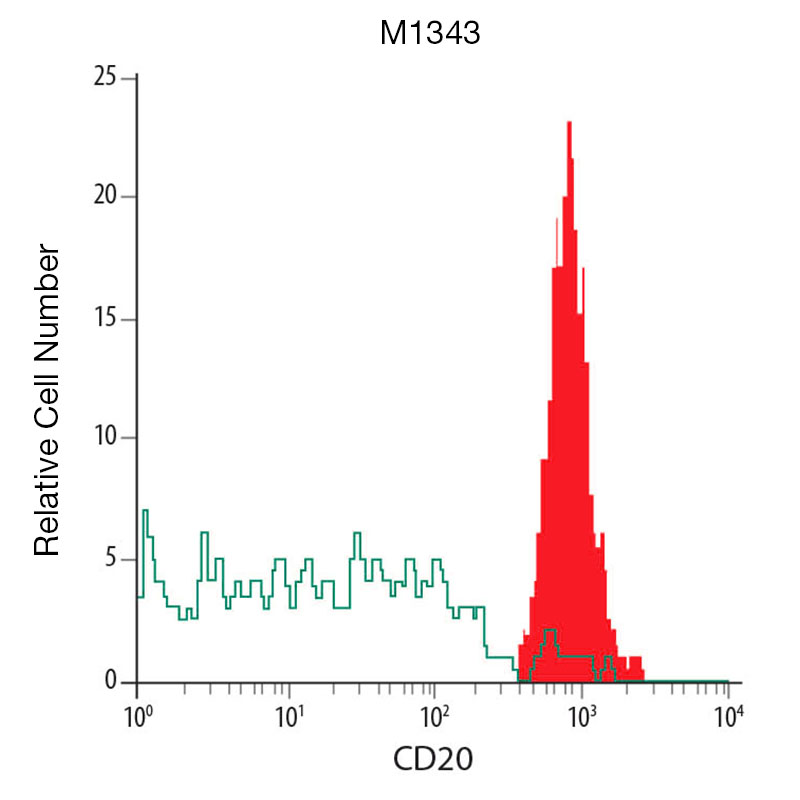Anti-Human CD20
Anti-Human CD20
Product No.: M1343
- -
- -
Clone 396444 Target CD20 Formats AvailableView All Product Type Monoclonal Antibody Alternate Names MS4A Isotype IgG1 Applications CyTOF® , FC , IHC |
Data
- -
- -
Antibody DetailsProduct DetailsReactive Species Human Host Species Mouse Immunogen Purified Recombinant Human MS4A (>98%) Formulation This monoclonal antibody has been 0.2 µm filtered and lyophilized from modified Dulbecco's phosphate buffered saline (1X PBS) pH 7.2 - 7.3 containing 5.0% w/v trehalose with no calcium, magnesium or preservatives present. Storage and Handling The lyophilized antibody can be stored desiccated at -20°C to -70°C for up to twelve months. The reconstituted antibody can be stored for at least four weeks at 2-8°C. For long-term storage of the reconstituted antibody, aseptically aliquot into working volumes and store at -20°C to -70°C in a manual defrost freezer. Avoid repeated freeze thaw cycles. No detectable loss of activity was observed after six months. Country of Origin USA Shipping Next Day Ambient RRIDAB_2831317 Applications and Recommended Usage? Quality Tested by Leinco Flow Cytometry: It is recommended to use the indirect method for signal enhancement when enumerating cells expressing MS4A. A suggested method would be to stain cells expressing MS4A with 25 µg per 1-2.5 x 105 cells in a total staining volume of 200 µl followed by PN:M1189. Additional Applications Reported In Literature ? Immunohistochemistry: 5-25 µg/mL CyTOF-ready: Ready to be labeled using established conjugation methods. No BSA or other carrier proteins that could interfere with conjugation. Each investigator should determine their own optimal working dilution for specific applications. See directions on lot specific datasheets, as information may periodically change. DescriptionDescriptionSpecificity Clone 396444 recognizes an epitope on human CD20. Background CD20 is a 33-37 kD transmembrane-spanning phosphoprotein that facilitates optimal B-cell immune response against T-independent antigens. It can exist in a complex with MHC class I, MHC class II, CD53, CD81, and CD82. However, CD20 can also form homo-oligomers. It has been suggested that homo-oligomerization of CD20 forms calcium ion channels in the plasma membrane of B cells. CD20 can be useful in diagnosing B-cell lymphomas and leukemias, and is the target of mAbs in the treatment of all B cell lymphomas, leukemias, and B cell-mediated autoimmune diseases. Interestingly, studies show a link between the immune system's B cells and diabetes mellitus in which anti-CD20 antibodies rendered the T cell antibodies dysfunctional and, hence, unable to cause insulin desensitivity by a B cell antibody-modulated autoimmune response. Antigen Distribution CD20 is present on human pre B lymphocytes and on B lymphocytes, except on plasma cells, and is expressed in tandem with surface IgM. It is also expressed in some follicular dendritic cells and at low levels on a T cell subset. Ligand/Receptor Src family tyrosine kinases, MHC class I, II, CD53, CD81, CD82 Function B cell activation PubMed NCBI Gene Bank ID UniProt.org References & CitationsTechnical ProtocolsCertificate of Analysis |
Related Products
- -
- -
Prod No. | Description |
|---|---|
C1682 | |
C1602 | |
C1653 | |
C1654 | |
C1674 | |
C1675 | |
C1676 | |
C1678 | |
C1680 | |
C1895 | |
C1652 | |
C1896 | |
C1651 | |
M1343 |



